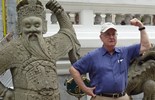
Albers Brief Spring 2016
A Publication of News and Current Events
from the Albers School of Business and Economics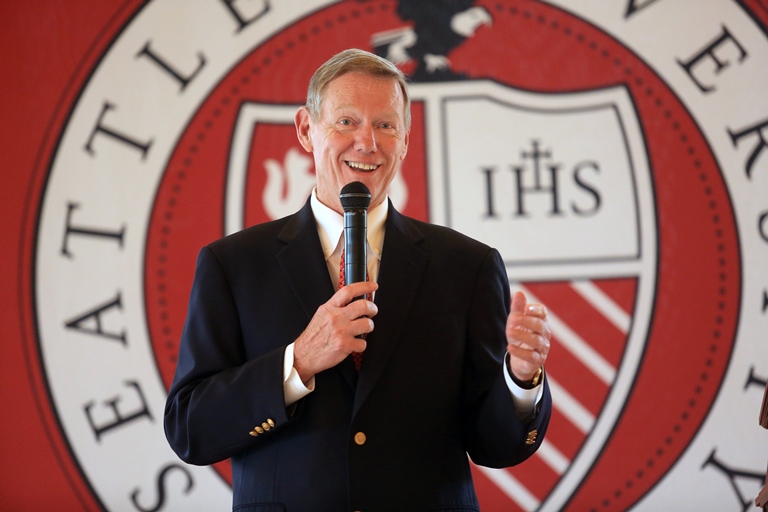
DEAN'S MESSAGE
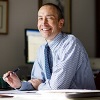
Now in the middle of another business year for the Albers School, we are excited to be working on the launch of our new MS in Business Analytics program in the fall. The initial reception from industry and potential students has been quite positive! Dr. Carlos de Mello e Souza, Associate Professor of Accounting, is heading up that effort as Program Director. We have also revised our MS in Finance curriculum to make the degree more compelling to finance students. We are already seeing a big jump in applications and enrollment.
The Speaker Series has attracted some prominent participants, which greatly benefits our students! In October, Alan Mulally, retired President and CEO of the Ford Motor Company, spoke on the impressive turnaround he led at Ford. Jamie Nordstrom, now President of Nordstrom Stores, gave great insight on how to be successful in a competitive retail environment. In January, Dan Price, CEO of Gravity Payments, explained his initiative to set the minimum salary at Gravity at $70,000, a move that has drawn national attention. Having speakers of this caliber provides exceptional opportunities for our students!
We are very proud that two of our alumni were selected for the inaugural group of the Association for the Advancement of Collegiate Schools of Business (AACSB) Influential Leaders. AACSB is the premier business accreditation body worldwide, and the Albers School has been an accredited member since 1965. You can read more about Gary Brinson and Mohamed Alabbar in the article in this edition of the Brief.
In the last edition of the Brief, I noted how globalization has become so dominant in everything we are doing in Albers. This edition just reinforces that. We have an article on an undergraduate business student who immigrated to the U.S. at the age of two, a retiring professor who led our global education initiatives, and an alumnus doing great things in Hong Kong and China! Not to mention the global impact of people such as Gary Brinson, Mohamed Alabbar, and Alan Mulally!
And, finally, thank you to all who share your time, talent, and treasure with the Albers School! It adds so much to what we are able to offer to our students.
NEW PROGRAM STARTING FALL 2016
Master of Science in Business Analytics

Albers is set to launch a new master’s degree program in fall 2016. The Master of Science in Business Analytics (MSBA) was developed in response to the need for people who can analyze and interpret vast amounts of data and communicate the results to business leaders for more effective decision-making. The first of its kind in the Northwest, the MSBA is designed to emphasize technical skills AND the abilities to (1) use those skills effectively in a business context, and (2) to communicate clearly with non-technically oriented managers in a way that they will understand and be able to act upon. Our graduates will be knowledgeable regarding business practices, language, and strategies so as to be able to comprehend problem situations and convey findings effectively to senior management.
The Albers MSBA program has been designed around fundamental business analytic skill requirements with the opportunity to concentrate in one of the following areas:
- Data Analytics (offered in collaboration with the College of Science and Engineering)
- Marketing
- Financial Economics
This 45 credit program is for those who have an interest in identifying complex business problems in terms of analytical models, obtaining solutions that achieve stated objectives, and translating the results obtained into recommendations for effective courses of action. The program was created for recent graduates as well as those looking to enhance their career opportunities or change direction in their already-established careers. Full-time students can complete this degree in one year.
Dr. Carlos De Mello e Souza is the Program Director for the MSBA.
For more information, go to www.seattleu.edu/albers/msba/.
REVISED CURRICULUM!
Master of Science in Finance

This fall, Albers will be introducing a revised curriculum for the Master of Science in Finance (MSF) program. Featuring fewer core classes and more electives, the MSF will be a 45 credit program. This is significant, because it will allow students taking classes full time the ability to finish the program in one year; part-time students can finish in as little as six quarters. In addition, the requirement for two years of work experience was dropped last year,so students can start the program immediately after completing their undergraduate degrees.
The new curriculum offers students the opportunity to specialize in any of three specialty tracks (or remain more general without a specialization):
- Financial Analyst/Investments
- Risk Management
- Corporate Finance
Dr. Ruben Trevino is the Program Director for the MSF.
For more information, go tohttp://www.seattleu.edu/albers/msf/
ALBERS FACULTY RESEARCH NEWS
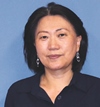
Lisa Zhao’s (Professor of Management) article, “Strategic Planning as a Complex and Enabling Managerial Tool,” coauthored with Michael Song (Harbin Institute of Technology), Richard J. Arend (University of Missouri-Kansas City), and Subin Im (Yonsei University), has been published in Strategic Management Journal.
Matt Isaac’s (Assistant Professor of Marketing) article, “Is Top 10 Better than Top 9? The Role of Expectations in Consumer Response to Imprecise Rank Claims,” co-authored with Aaron R. Brough (Utah State University) and Kent Grayson (Northwestern University), has been accepted for publication in the Journal of Marketing Research.
Tina Zamora (Assistant Professor of Accounting) has had two papers accepted for publication: “Managers’ Strategic Reporting Judgments in Audit Negotiations,” with Helen Brown-Liburd (Rutgers University) and Arnie Wright (Northeastern University), in Auditing: A Journal of Practice and Theory. The second is, “Nonfinancial Information Preferences of Investment Professionals,” with Jeff Cohen (Boston College) and Lori Holder-Webb (Western New England University) in Behavioral Research in Accounting.
Greg Magnan’s (Professor of Management) article, “Why Supply Chain Collaboration Fails: The Socio-Structural View of Resistance to Relational Strategies,” co-authored with Stan Fawcett (Brigham Young University), Matthew McCarter (University of Texas, San Antonio), Amy Fawcett (Weber State University), and Scott Webb (Brigham Young University), has been accepted for publication in Supply Chain Management: an International Journal.
Colette Hoption’s (Associate Professor of Management) paper, “The Double-Edged Sword of Helping Behavior in Leader-Follower Dyads,” has been accepted for publication in the Leadership and Organizational Development Journal.
Katie Fitzpatrick’s (Assistant Professor of Economics) article, “The Impact of Food Deserts on SNAP Participation and Food Insufficiency among the Elderly,” co-authored with Nadia Greenhalgh-Stanley (Kent State University) and Michele Ver Ploeg (U.S. Department of Agriculture), has been accepted for publication by the American Journal of Agricultural Economics.
Marinilka Kimbro (Assistant Professor of Accounting) has had her study, “The Accounting Treatment of Goodwill, Idiosyncratic Risk and Market Pricing,” co-authored with Danielle Xu (Gonzaga University), accepted for publication in
the Journal of Accounting, Auditing and Finance.
Meena Rishi (Professor of Economics) has had three papers accepted for publication. The first is, “Determinants of CO2 Emissions for Post-Soviet Independent Countries,” co-authored with Jeong Hwan Bae and Dmitriy D. Li (both of Chonnam National University (S. Korea)), which has been accepted for publication in Climate Policy. The second is, “ASEAN plus Six and Successful FTAs: Can India Propel Intra-Industry Trade Flows?” co-authored with R.U. Das and J.D. Dubey (both from
Research and Information System for Developing Countries (RIS-New Delhi)), accepted for publication in the Journal of Developing Areas. The third is, “Risk Factors for Domestic Violence — An Empirical Analysis for Indian States,” accepted for publication by The Journal of Developing Areas.
Bonnie Buchanan (Associate Professor of Finance) has had two articles accepted for publication. The first is, “Securitization in China — Deja Vu?” accepted by the Journal of Structured Finance. The second is, “The Way We Live Now: Financialization and Securitization,” accepted by Research in International Business and Finance.
Ben Kim (Professor of Management) has had two articles accepted for publication in Issues in Information Systems. The first, “The Current State of E-Books and Digital Libraries in Japan,” was co-authored with Hisaki Goto (Kaichi International University, Japan) and Professional MBA student Kohji Inagaki. The second one, “Data Mining Analysis and Predictions of Real Estate Prices,” was co-authored with Professional MBA students Victor Gan and Vaishali Agarwal.
Al Ansari’s (Professor of Marketing) article, “Outsourcing in the Persian Gulf Petroleum Supply Chain,” co-authored with Emil Thies and Batoul Fathi (Zayed University), has been accepted for publication in Strategic Outsourcing: an International Journal.
Marc Cohen (Associate Professor of Business Ethics) has had two articles accepted for publication. The first is, “Alternative Conceptions of Generalized Trust (and the Foundations of the Social Order),” accepted in the Journal of Social Philosophy. The second is, “The Movement from Ethics to Social ;Relationships, and Why Decency Obscures Obligation, According to
One of Levinas’s Talmudic Readings,” accepted by the International Journal for Philosophy of Religion.
Jennifer Marrone’s (Associate Professor of Management) article, “Preparing Students for Leadership through Experiential Learning,” co-authored with Professional MBA students Lauren Rockholz, Maria Bauermeister, Megan Pahl, Angelina Kalinovich, Barry Wilson, and Jonathan Greer, has been accepted for publication in The Journal of Leadership Education.
James Lee (Genevieve Albers Visiting Fellow, Management) and Jessica Imanaka’s (Associate Professor of Business Ethics) paper, “Managing Virtuality in Enterprise Social Systems,” has been accepted for publication in the International Journal of E-Business Research.
Sarah Bee’s (Senior Instructor in Accounting) paper, “Assembly FG: An Education Case Study Using QuickBooks as the AIS for a Small Manufacturing Business,” co-authored with Lane Lambert (University of West Florida), has been accepted for publication in the AIS Educators Journal.
STUDENT PROFILE: HAMZA HADDADI
Finding Similarities in Soccer and Business
Albers senior Hamza Haddadi has made a major contribution to the Seattle University soccer team in his four years here. This past season he was not only a member of the team that won the WAC conference and went to the NCAA Sweet 16 for the first time in the school’s Division 1 history, but he also scored the game-tying goal in the WAC men’s soccer tournament Championship along with the game-winning penalty kick, and then scored the winning goal against UCLA in the second round of the NCAA championships.
Haddadi grew up in a family that was very athletic. His mother was a competitive handball player and his father played soccer. All of his siblings were involved in sports too. Haddadi started out taking karate when he was young, but gave that up for basketball and soccer. He played both sports through middle school, at which time soccer became his year-round sport. He was recruited to play soccer at Seattle University — obviously a good move on our part!
Soccer was not the only reason Haddadi chose Seattle U. Of his three older siblings, his oldest sister went to Seattle U and the other two went to another local university. “My oldest sister had the best experience,” he said. “She loved it here.” The other important factor to him was that he would be close to his family, who live just north of Seattle. It also allowed his parents to be able to go to his soccer games. “My parents are great,” he said. “They support us in everything we do.”
Haddadi entered SU as a pre-major not sure what direction he wanted to take. After hearing some of the older players on the soccer team talk about how much they liked the business school, he decided to look into it. He eventually decided to major in business management. He sees many similarities between business and soccer, and plans to take advantage of those in the future. In particular, he noted the emphasis on team building and how to get the best out of people, how to use the different skills each person brings to the team, and the successes of various motivators and incentives. Haddadi is interested in project management, which he compares to soccer in that you need to meet deadlines and hit goals. Being a member of the soccer team made a big impact on Haddadi’s experience at SU. He believes that soccer helped him accomplish his goals here. While other students “come in blind,” being on a team means that “there is already a foundation set for you with the coaches, teammates, etc.,” he said. This eased the transition of being away from home and navigating the first months of being a college student.
“I could not be more proud of what Hamza has accomplished at Seattle U in the classroom, in the business school, and on the soccer field." said Pete Fewing, Seattle U men's soccer coach. "He truly embodies passion for the game, is a terrific leader, is very committed, is a great teammate, and a guy you want to have on your side.”
At the age of two, Haddadi’s family moved from Algeria to Shoreline, Washington. He is bilingual in Arabic and English and can understand French pretty well. In addition to being very involved in soccer in high school, Haddadi participated in Running Start, which allows students to take college classes while still in high school. He has also taken extra classes, and so will be graduating in March 2016. He is an excellent student and was awarded the Eddie O’Brien Student-Athlete of the Year last year by the Athletics Department. After graduation, Haddadi hopes to continue his soccer career on the professional level. He played in the combine for the San Jose Earthquakes this past November and was also invited to the Seattle Sounders combine in December.
ALBERS EXECUTIVE SPEAKER SERIES
By Rubi Cammarota, Professional MBA Student ('17), Graduate Assistant for the Albers Marketing Department
Strategic & Operational Leadership and Working Together
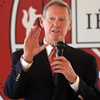
Alan Mulally retired as CEO of Ford Motor Company on July 1, 2014, but his impact will continue to be felt for many decades to come. When he took over Ford in September of 2006, the company was forecasted to lose $17 billion and was on the road to bankruptcy. Through implementing ingenious company-wide financial, managerial, and cultural changes, Mulally helped Ford rise once again to be one of the leading automobile manufacturers in the world.
Mulally began his career as an engineer for Boeing in 1969. After working on the design and program management for many of the world’s most well-known airplanes, he was eventually promoted to vice president of Boeing and CEO of Boeing Commercial Airplanes. He was in charge of many important programs at Boeing and was largely credited with its resurgence against Airbus in the mid-2000s. When he left to go to Ford, Mulally was the first-ever automobile outsider to be appointed as CEO of an automotive company.
Mulally may be best known for his open-communication management style, his ability to unite a company under one vision and strategy, and his dedication to work as a team to solve problems. Because of his devotion to his customers’ needs, his employees’ well-being, and to making high-quality products, he led Ford to be one of the only automobile companies that didn’t file bankruptcy or need a government bailout during the Great Recession.
Follow the Customer
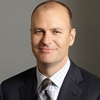
Nordstrom began as a modest shoe store with one downtown Seattle location that defied the odds to survive the Great Depression. Now with over 320 multi-format stores, the publicly traded company has come a long way to be known as one of the premier retailers in the United States and Canada.
President of Stores, Jamie Nordstrom, is a fourth generation family member and great-grandson of founder John W. Nordstrom. With his innovative ideas and strategies on “going with the customer,” Nordstrom, Inc. continues to defy the odds by staying relevant in an ever-changing retail landscape.
Nordstrom has seen the world of retail sales change firsthand. As a shoe salesman in high school and college, he watched as the salesperson-controlled environment transitioned to one where the customer has all of the power. Because of the ubiquitous influence of technology, shoppers no longer rely on the salesperson for the best deals, product information, or even the latest styles. Now, customers have all of the options and inventory in the world at their fingertips and they demand convenience, control, and autonomy in their shopping experience. Nordstrom is listening to their demands by constantly making investments to provide a customized customer experience in a multichannel environment.
With differentiated types of businesses such as Nordstrom Rack, Trunk Club, and HauteLook, as well as its strong online and mobile platforms, Nordstrom is going where the customer goes and making sure they are front and center. “The difference between the retailers that succeed over the next decade and the ones that die and go away are those experiences, the functionality, giving customers the control and allowing them to shop the way they want to shop,” said Nordstrom.
More Than Business Plan: My Mission to Help the Little Guy or Gal Achieve Their American Dream

Dan Price, the 31-year-old internationally recognized CEO of Gravity Payments, did not look like a typical CEO when he spoke to a packed Seattle University auditorium in January. Donning neon green Nikes, long, flowing hair, and tight jeans — one may easily have mistaken him for a student. Mr. Price may look casual from the outside, but his awards and recognitions give him the prestige of someone many years his senior — and in a three-piece suit.
Named “The Entrepreneur of 2014” by Entrepreneur Magazine, “Young Entrepreneur of 2013” by GeekWire, and honored with an invitation to the White House to meet with the president himself in 2010, Price could have simply staked his claim to fame based on his accolades as a young 20-something. However, he wasn’t ready to stop his revolution there.
In 2015, Price raised the minimum salary for every employee of Gravity Payments, a credit card processing company, to $70,000. This highly controversial move was inspired by a study on well-being that showed that happiness is correlated to one’s salary and rises until about $75,000 a year. Price, who was making upwards of $1 million a year at that time, made his decision final after a conversation with a friend revealed that she was about to encounter a personal financial crisis because of a $200-a-month increase in rent. He knew that he had to make a change. “The market rate for me as a CEO compared to a regular person is ridiculous,” said Mr. Price. So when he increased the wages of his employees, he lowered his own salary to $70,000 also.
This issue of wage inequality in the workforce is at the forefront of many people’ s minds as a result of the presidential debates, Seattle’s minimum wage increasing to $15 an ;hour, and lingering effects of the Great Recession and Occupy Wall Street. This young CEO has not only changed the lives of each of his employees, but he is paving the way for other businesses that will begin to bridge the divide in pay between the C-Suite and the average Joe and Jane.
REACHING OUT TO THE COMMUNITY
By Sue Oliver, Executive Director of the Center for Innovation & entrepreneurship

Over the past year, the Albers Innovation Entrepreneurship Center (IEC) has explored how best to cultivate the economic growth and development of small businesses within the local neighborhood via a small business resource center, or “Hub.” In partnership with Seattle U’s Youth Initiative (SUYI) program and Center for Community Engagement, the emerging Hub will focus the resources of Seattle U’s students, faculty, staff, volunteers, company sponsors, community partners, and existing service providers to serve the local small businesses and their families, particularly women, minorities, immigrants, and refugees. In this way, Albers can leverage Seattle U’s core values of social justice, ethics, and sustainability and its long-standing status as an anchor institution and community partner to encourage the growth and economic development of a thriving local neighborhood.
For many years, Seattle U has offered supporting services to local small businesses through its various classes, projects, and programs. In addition, SUYI has galvanized the university’s resources to support the educational and life success of neighborhood youth and their families. The new Hub would build upon Seattle U’s existing foundation to orchestrate deeper, consistent, longer-term, and more integrated support services to the local small businesses. Below are some emerging examples of these kinds of services:
- Recently, the IEC and an Enactus (a student club) team began collaborating with Muses, a conscious fashion studio that is building an extensive apparel production training program for low-income immigrant and refugee communities in Seattle, in order to bring a sustainable face to apparel manufacturing. Co-founder Sandrine Espie (SU MPA ’11) and the SU team are exploring ways to grow Muses’ current capacity, beginning with a market study. In addition, Muses has teamed up with a 2015 Seattle U business plan competition participant to create textile jewelry made out of recycled clothing. “A motivated and brilliant team of students is in charge of implementing a market study for Muses,” says Sandrine. “We are looking forward to working with them.”
- Over the past 18 months, several Albers students have been working with business owner Asfaha Lemlem to help grow his local Ethiopian injera bread business, LemLem Bakery, and to launch his future coffee shop and roastery. Asfaha is an active community leader, director of the Yesler Community Center RecTech youth program, and a SUYI advisory board member. Last year, Diane Fisch (EMBA ’15) and two other Albers students created a business plan for Asfaha’s bakery, while another team developed a marketing plan. States Asfaha, “Diane asked me a question: ‘Where do you want to see yourself and the business in 5 years?’ And that really prompted me to take myself out of the daily routine and imagine the long term.” This past summer, the IEC and a visiting Brazilian engineering student examined the bakery’s processes and equipment. SU students are benefitting greatly from this deepening relationship with Asfaha, as they hone essential skills for building their careers, build stronger neighborhood connections and engagement, and learn how to foster local economic development.
- Amanda Waite, graduating Albers senior, is an example of a successful student leader who has been participating in these experiential learning opportunities. As Enactus Club President and IEC project coordinator intern, she has been leading projects among local small businesses for he past few years. She sees the win/win aspects of doing so: “Working in the local community with business owners like Asfaha is extremely motivating and rewarding,” says Amanda. “Seeing our efforts go towards direct and specific accomplishments in the community turns our classroom knowledge into practical skills. Projects like these have definitely been the most rewarding part of my experience at Albers."
FACULTY PROFILE – PETER RAVEN
A GLOBAL CITIZEN
Professor Peter Raven has always been a man on the move. Born in Berkeley, California, his family moved to Bahrain Island in the Persian Gulf when he was three because his father was working for an oil company there. But that was not his last stop. He also lived in New York State, Eastern Washington, and London as a child. He earned his Bachelor of Science degree at Cornell in upstate New York, then moved to Belvidere, Illinois, to start his first job with the Green Giant company. After about a year there, Raven was drafted, which prompted him to enlist in the U.S. Army to get a more appropriate position. While serving in the army, he was stationed at Ft. Knox, Kentucky; Munich, Germany; and Austria. He went back to California to do graduate work at the University of California, Davis, then eventually did his PhD work at Washington State University (WSU) in International Marketing.
You would think that after all his world experiences at such a young age that Raven would naturally study international business in college. You would be wrong. Business is actually his third chosen career. His lifelong dream was to be a fighter pilot, but high school and college helped him find another direction. In high school, “I read an article about how food scientists were working on helping to feed the impoverished people of the world, and I knew what I wanted to do,” Raven said. He majored in Food Science as an undergraduate and then earned an MS in International Agricultural Development and Food Science.
After working in agribusiness for a number of years, Raven was ready for a change. A friend of his was the chair of the marketing department at WSU and encouraged him to pursue a PhD. He agreed and went on to earn his PhD in Business Administration with a concentration in international marketing from WSU.
Raven taught at Eastern Washington University for seven years after finishing at WSU. He came to Albers in 1998 as a visiting professor, until a tenure-track position opened up three years later and he was hired. His expertise coming in was in international/global marketing, but his interests expanded into entrepreneurship after working with Professor Harriet Stephenson developing courses for her entrepreneurship curriculum. He developed and taught the New Venture Creation course in 1999, then created the Internet Marketing course and Entrepreneurial Marketing class, which he taught at both the undergraduate and graduate levels.
Raven’s research interests have revolved around international/global marketing. His research has focused on export marketing, travel planning, and, most recently, on women entrepreneurs in Vietnam. He also has been very involved in the Global Business EDGE program, which won the 2007 President’s “E” Certificate for Export Service presented by the Secretary of Commerce, and he is on the board of a nonprofit organization focused on developing affordable housing in Seattle.
Raven is married and has a son who is a professor of philosophy at the University of Victoria in British Columbia. When not at work, he likes to “relax with my flight simulator, travel, read books, jog, and visit with friends,” he said. He used to ski, but “knee issues encouraged me to retire my skis.” When he retires in June 2016, Raven plans to pursue his passion for writing a biographical story of his family’s adventures in the Middle East and other areas of the world. “I was lucky to have had many experiences,” he said, and he wants to communicate them to his family and others.
ALUMNI PROFILE: KEVIN DONG
A RESPONSIBLE ENTREPRENEUR

It takes a lot of courage to move halfway around the world to go to college, but that is exactly what Albers alum Kevin Dong (BABA-Marketing) did. Having grown up in China, Dong felt that the United States was the best country in which to learn business because so many of the well-known global brands started here. He was also looking for “a great learning environment and a strong faculty team,” he said. He chose Seattle University based on the recommendation of a Taiwanese friend. A bold decision, but one that turned out to be the right one. He graduated with a degree in marketing in 2003.
Dong credits Albers with helping him on his way to a successful career. He said he came out of Albers with “more confidence in setting up a company, the ability to analyze a business objectively and rationally, and the knowledge of how to promote a product efficiently.” In particular, he thanks Professors Teresa Ling, Bob Callahan, and Harriet Stephenson for teaching students “a lot of practical skills and methods which objectively help us in the real business world.”
Although some may see Dong as “just another businessman,” he is proud that many of them eventually discover that he is “a very responsible entrepreneur.” He returned to Hong Kong after graduating from Seattle U and started a business in Shenzhen, China, which is near to Hong Kong. According to Dong, “I decided my career by analyzing my total resources and high potential products in this fast-developing market.”
Dong originally started as the sole importer for Handpicked Wines, which sourced its wines from Australia. He and his brother eventually became the biggest shareholders in the company and today also own three vineyards in Australia. Handpicked Wines is an innovative international brand that currently produces wines from six countries under the same brand name. It plans to expand into making wines from grapes in more countries in the future. Its goal is that Handpicked will make the most represented wine varieties from the most wine producing countries in the world. The wines are currently sold throughout China, in addition to Japan, Korea, Singapore, Thailand, Taiwan, and Macao.
Handpicked Wines also runs the Handpicked Love Charity Foundation that provides surgeries for low-income children throughout China who have congenital heart disease. Since 2006, each time a bottle of Handpicked wine is sold, Handpicked Wines donates one dollar (RMB) to the foundation. The Handpicked Love Charity Foundation has helped more than 500 children recover from their congenital heart disease; each operation costs about 20,000— 30,000 RMB. The company follows the principles of the ‘triple bottom line,’ which focuses on people, planet, and profit or, said another way, social, environmental, and business.
Starting and running a business is not easy in China. The business environment and policies frequently change, but Dong is confident that “we will conquer all the problems and barriers yet to come.” Handpicked Wines is gaining more and more loyal customers and brand recognition is increasing. The original goal was to be the number one imported brand wine in China in 20 years. With about ten more years left, “we believe we can realize our goal,” Dong said.
Dong grew up in Guangdong and Hong Kong, China, and currently lives in Hong Kong with his wife and three children. He travels frequently to support his distributors, who are mostly in Taiwan, Hong Kong, and China. When not working, Dong likes to travel even more.
As for advice that Dong has for Albers students and alumni: “Get involved in real operations as much as you can, especially with those current businesses that relate to your major.”
AACSB INFLUENTIAL LEADERS CHALLENGE
Albers is honored to announce that two of our distinguished alumni, Gary P. Brinson and H.E. Mohamed Ali Rashed Alabbar, were selected for the AACSB International’s prestigious Class of Influential Leaders list in 2015. AACSB, the Association to Advance Collegiate Schools of Business, is the premier global body for business school accreditation.
The Influential Leaders from AACSB Business Schools Challenge recognizes business schools for their work in developing exceptional leaders and industry innovators. Brinson and Alabbar were recognized for demonstrating an innovative mindset, entrepreneurial spirit, significant business impact, and for engendering dramatic community and social change.

Gary Brinson graduated from Seattle U in 1966 with a degree in finance. After earning his MBA at Washington State University, Brinson joined a portfolio management group at Traveler’s Insurance rather than pursue a PhD at Stanford. This was a turning point in his career, as he rose through the ranks to become CEO of Traveler’s Investment Management Company. He then moved to First Chicago Bank to pursue his interest in investing globally. He and his coworkers bought out their investment group from First Chicago in 1989 and founded Brinson Partners, which was subsequently acquired by Swiss Bank in the mid-1990s and then Swiss Bank was acquired by UBS. Brinson became chair of UBS Asset Management and led the group until 2001.
Brinson has been very active in the CFA Institute, the organization that oversees the Chartered Financial Analyst designation. He has been honored with the (CFA) Award for Professional Excellence and was a recipient of the Financial Management Association’s Outstanding Financial Executive Award and the Graham and Dodd Scroll. CFA Institute Magazine included Brinson in its 2003 cover story about living legends in the investment profession. He was one of seven individuals featured in the article.
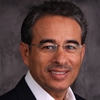
H.E. Mohamed Ali Rashed Alabbar is one of the leading entrepreneurs in the Middle East and has had a major impact on the economics of the region. After graduating from Seattle U in 1981 with a degree in business administration, Alabbar returned to Dubai to take a position as manager of banking supervision in the Central Bank of the UAE. Later, he was appointed director and general manager of Al Khaleej Investments, a government-owned investment company with significant real estate interests, and through this position he solidified his presence in the real estate sector. He went on to help establish Emaar Properties, Dubai’s largest real estate group.
Alabbar is well known for his pioneering role in positioning Dubai as a world-class city. He has been recognized for his business acumen and his influence in the Arab region in many prominent publications. Alabbar has put his status and leadership abilities to good use by serving as a member of the Dubai Executive Council and the Dubai Economic Council, as well as vice chair of the Dubai Aluminum Company (DUBAL).
MARK YOUR CALENDARS

Albers Executive Speaker Series
Events are held in Pigott Auditorium from5:30-6:30 p.m. (unless otherwise posted)
Free and open to the public
Rich Barton
Co-founder Executive Chairman, Zillow Group; Co-founder of Expedia, Glassdoor, Trover
"Power to the People: How Technology is Catalyzing a New Industrial Revolution"
Tuesday, April 19, 2016
Mark Mason
CEO, HomeStreet Bank
Thursday, May 12, 2016
___________________________
Albers Career Center Events
Spring Job and Internship Fair
Thursday, April 21, 2016
11:30 a.m. – 2:30 p.m.
Campion Ballroom
Albers Grad Networking Reception
Wednesday, April 27, 2016
4:30 – 6:30 p.m.
Casey Commons
Albers Volunteer Recognition Reception
Thursday, May 12, 2016
4:00 – 5:30 p.m.
Casey Commons
A celebration to honor Albers Advisory
board members and mentors.
___________________________
Albers Student Awards & Reception
All Albers students, faculty, staff, and
alumni are invited to both events.
Friday, May 6, 2016
4:00 – 6:00 p.m.
Pigott Auditorium & PACCAR Atrium
Beta Gamma Sigma Induction Ceremony
Friday May 6, 2016
Pigott Auditorium
This is the 50th annual event honoring Albers’s top scholars.
___________________________
44th Annual Accounting Awards Banquet
Friday, June 3, 2016
Reception: 5:00 – 6:00 p.m.
Campion Tea Garden (Weather Permitting)
Banquet: 6:00 – 8:00 p.m.
Campion Ballroom
For tickets and information, please contact Jani Medeiros, medeirj@seattleu.edu.
____________________________
Business Insights Breakfast
Wednesday, May 11, 2016
7:00 – 9:00 a.m.
Student Center 160
Guest Speakers:
Jeffery Smith, Frank Shrontz Chair of Professional Ethics
Carolyn Barton, VP of Ethics at Group Health
Part of Business Ethics Week
____________________________
Graduate Programs Information Sessions
Seattle: April 19, May 21, June 7
Bellevue: April 13, May 11, June 1
For details on these information sessions and future ones, and to RSVP, go to the Albers Graduate Information Sessions page on our website.
_____________________________
2016 Harriet Stephenson Business Plan Competition
Trade Showcase/Elevator Pitch Round
Wednesday, April 13, 2016
11:00 a.m. – 2:00 p.m.
Campion Ballroom
Finals Pitch Competition & Awards Reception
Tuesday, May 17, 2016
4:00 – 7:30 p.m.
Campion Ballroom
RSVP Required: Please email Nettasha Reese at ecenter@seattleu.edu to be put on the list.
______________________________
Strengthen Your Connections
The Albers Alumni Board meets six times a year to develop and organize the alumni programming you enjoy at Albers. Deepen your commitment to Albers in service of your fellow alumni and you will soon experience the value of being connected at this level. If you would like to serve on the Board, contact Rob Bourke at bourker@seattleu.edu.
Stay Connected
Visit the Albers Alumni website for alumni events and updates. www.seattleu.edu/albers/alumni/
Connect With Us
Follow us on our social media sites for updates on speakers, events, and news. Engage in discussions and networking opportunities. If you have ideas on what you would like to see on one or more of these sites, please email Barb Hauke at haukeb@seattleu.edu.

